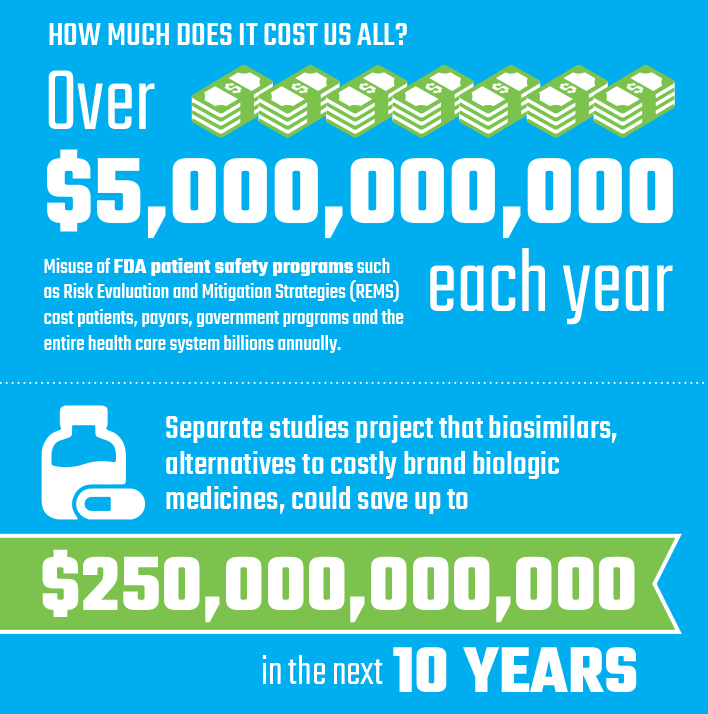Patient safety is our industry’s top priority. FDA-mandated Patient safety programs are the guardrails of our industry. These programs protect patients and the trust they put in medicines by ensuring the benefits of medications outweigh potential risks. Unfortunately, some brand companies have engaged in tactics that abuse these patient safety programs. These abuses cost patients in the form of reduced access and higher drug costs – as much as $5.4 billion each year according to one study.
“Medicare beneficiaries aren’t always fortunate. The median out-of-pocket cost for a Medicare beneficiary taking Revlimid is $11,500 per year. It is the most expensive Medicare drug. It’s clear to me that Celgene is gaming our system. It is using the bogus pretext of Risk Evaluation and Mitigation to unlawfully deny samples to generic manufacturers in order to prevent them from developing a cheaper alternative.” — David E. Mitchell, Founder, Patients For Affordable Drugs, Hearing of the U.S. House of Representatives Committee on Oversight and Government Reform Subcommittee on Health Care, Benefits, and Administrative Rules, March 22, 2017
How is Big Pharma Slowing Down and Blocking Access to Generics and Biosimilar Drugs?
One tactic involves abusing the FDA-mandated Risk Evaluation and Mitigation Strategies (REMS) program to prevent generic competitors from purchasing samples of a drug that are needed to conduct the necessary testing to obtain FDA approval. By exploiting this loophole, brand manufacturers can block competition and keep prices higher — and one recent study shows why: the combined size of the restricted access drug segment is 74 drugs with total sales in 2016 of $22.7 billion. That’s 22 billion reasons why certain brand manufacturers want to keep lower cost alternatives off the market — at the expense of needy patients.
“We know that processes related to the REMS, which are intended to ensure that certain drug products are used safely, are sometimes used in ways to slow generic competition.” — Dr. Scott Gottlieb, FDA Commissioner May 25, 2017 – Testimony in front of House Appropriations Committee
Some brand drug manufacturers like Turing Pharmaceuticals – the company that raised the price of an AIDS treatment more than 5,000% overnight – voluntarily created its own safety program (FDA did not require it) to keep more affordable versions of that drug from coming to market.
John Hass, the company’s director of patient access, said so explicitly, noting that generics wishing to buy samples of the drug would not be welcome. Hass said:
“Most likely I would block [a generic purchase]…We spent a lot of money for this drug. We would like to do our best to avoid generic competition. It’s inevitable. They seem to figure out a way [to manufacture a generic alternative] no matter what. But I’m certainly not going to make it easier for them.”
Decreased Access Means Increased Costs!
There is a Solution to Close this Loophole!
The generic drug industry makes medicines more affordable and accessible for Americans. This isn’t a partisan matter.
“Generic drugs are an American success story, and have saved probably a trillion and a half dollars for American consumers over the last 10 years.” — Representative Michael Burgess (R-TX), Chairman of the House Energy and Commerce Health Subcommittee
“We know that when generic drugs compete in the market drug prices come down dramatically.Although 9/10 prescriptions are for generic medications, generic drugs make up only 28% of the total cost of prescription drug spending.” — Representative Kurt Schrader (D-OR), Member House Energy and Commerce Committee
Today, bipartisan legislation in the House and Senate, called the CREATES Act (S. 974/H.R. 2212) and the FAST Generics Act (H.R. 2051), prohibits companies from using restricted access programs to block or delay generic competition.
How Can You Make a Difference?
We encourage patients, health care providers, and advocates to add your voices to this vital campaign.
- Read more about REMS abuse
- Contact your Senator or Representative to urge them to do more to ensure access to safe, effective and more affordable generic and biosimilar drugs
- Active your social networks; use the hashtags #stopREMSabuse, #generics
- Help educate others by sharing infographics about generics and biosimilars
Robust competition in the pharmaceutical market underlies two complementary goals: greater innovation and lower prices. Innovation brings new solutions to patients faster, while lower prices mean that more of those patients will be able to afford the medicines they need. Ensuring that safe, effective, and more affordable medicines make it out of the lab and into the hands of the people who need them is a goal that touches not just those people and their families but the entire nation.

By Erica Klinger, AAM Marketing Director


